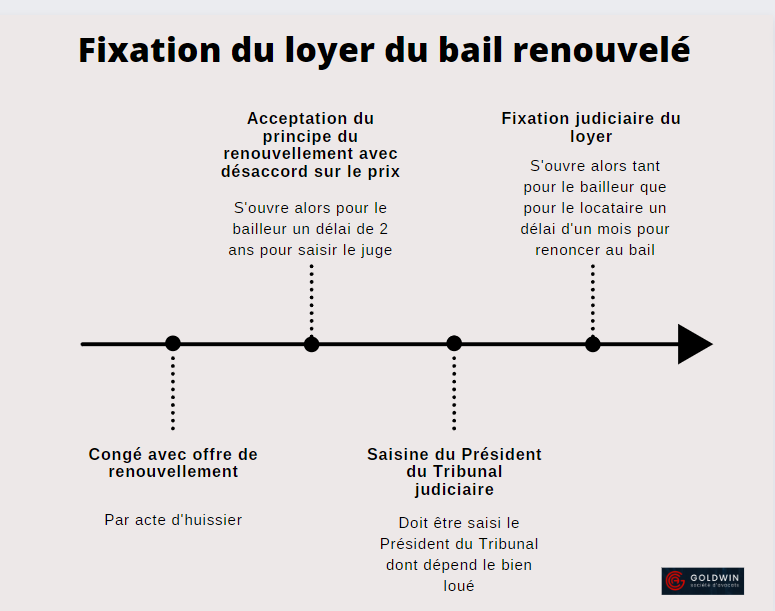Summary
- Dissociation between lease renewal and rent setting: notice with renewal offer
- Revising the rent for a renewed lease
- The judicial review procedure
What did you think of this article? Rate it!
TEAMS
Our lawyers
Skill
Our expertise in Commercial Law
Criminal lawyer for police custody: your rights and defence strategy from the outset
All you need to know about embezzlement with your criminal lawyer
Personal data theft: contact your lawyer!
The role of your lawyer in managing your commercial disputes
Managing conflicts between heirs with your lawyer
Your customs lawyer in Paris
Tax inspections: your public law lawyer will defend you!
European arrest warrant: an update from your criminal lawyer
Your extradition lawyer – Goldwin Avocats in Paris

Dissociation between lease renewal and rent setting: notice with renewal offer
Once a commercial lease has expired, there are several possible solutions.
On the one hand, the tenant can take the initiative by sending a request for renewal of the commercial lease to the owner of the commercial premises.
Alternatively, the lessor can :
- Not wish to enter into a new lease agreement, in which case he will have to send his tenant notice and owe him eviction compensation.
- Propose to enter into a new lease for the rented premises only on condition that the rent is revised.
Article L.145-11 of the French Commercial Code allows lessors to send their lessees a notice of termination with an offer to renew by bailiff. To this end, Cabinet Goldwin puts at your disposal its network of partner bailiffs throughout France.
The new rent may be expressly or tacitly accepted by the tenant. The latter occurs when the tenant starts paying the new rent without reservation. The tenant then loses the right to dispute the amount of the new rent(Civ. 3e, 2 Feb 2010, no. 09-65.084).
However, the tenant may also agree in principle to the renewal of the lease, while disputing the amount of rent proposed by the landlord. If the tenant continues to pay the old rent, the landlord has 2 years in which to bring an action to fix the rent. In the absence of such action, the new lease will be deemed to have been concluded at the previous rent.
Revising the rent for a renewed lease
The rent for a commercial lease may be revised at the end of each three-year period during the term of the lease or when a new contract is entered into.
In the absence of agreement, the amount of the rent is set by the judge, taking into account a number of factors, including the characteristics of the premises, their purpose, location, and the rents charged by neighbouring businesses, etc.
Although the judge is obliged to take these various factors into account in his decision, his discretionary power means that he has full discretion as to the importance of the various factors in determining the rent. Such a procedure is therefore lengthy and the outcome uncertain.
However, in the absence of a significant change in these factors, and if the expired lease has not exceeded 12 years by tacit extension, the rate of change in the renewed rent may not exceed the change in the commercial rents index since the start of the expired lease.
Let’s take a simple example:
- Commercial rent index for the last quarter of 2012: 108.34 ;
- Commercial rent index for the last quarter of 2021: 118.59 ;
- An increase of 9.46%.
For an original lease signed in 2012 for a monthly rent of €3,000, the rent for the lease renewed in 2021 may therefore not increase by more than 9.46%, and thus exceed €3,283 per month.
Since the Pinel Act of 2014, and even in the event of a removal of the ceiling, the variation may not in any event lead to an increase of more than 10% in the rent paid by the tenant the previous year. For a rent of 4,000 euros per month paid in the last year of the lease, the increase may therefore not exceed 400 euros per month.
The judicial review procedure
Jurisdiction for judicial review of commercial rents lies with the President of the Judicial Tribunal for the area in which the leased premises are located. Either the lessor or the lessee may apply to the Court by bailiff or by registered letter with acknowledgement of receipt.
During the proceedings, and unless expressly requested otherwise, the rent paid by the tenant is that due under the old lease.
However, the rent set by the judge at the end of the proceedings is due retroactively to the date of the initial application, which can lead to substantial arrears if the judge rules in favour of the landlord.
For example, after a year’s lengthy proceedings, at the end of which you will have obtained a monthly increase of 200 euros, your tenant will owe you 2,400 euros in rent arrears.
Once the rent has been set by the judge, both the landlord and the tenant have a period of one month in which to withdraw from the lease renewal on the terms set by the judge. If the lessor withdraws from the lease, he will have to pay an eviction indemnity to his tenant.





Discover all our articles on commercial law.
Aucun article sélectionné.

